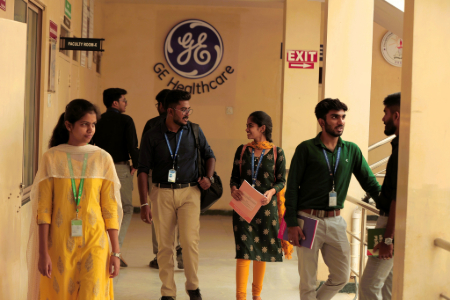

The Department of Computer Science and Engineering (CSE) was established in 1994 and has since earned NBA accreditation on five occasions. The department offers Post Graduate Programme on M.E Artificial Intelligence and Data Science. The department boasts exceptional infrastructure and has secured funding from prestigious agencies such as AICTE, UGC, DRDO, ISRO, and BRNS. It has also forged strategic partnerships through Memoranda of Understanding (MoUs) with leading organizations including TNAU, L&T Technologies, GE Healthcare, Zeuron.ai, Pricol Technologies Ltd., Roots Industries India Private Limited and the Health Care Centre for Innovation. These collaborations focus on advancing research and development in areas such as Artificial Intelligence and Machine Learning (AI & ML), Augmented Reality and Virtual Reality (AR & VR), Software Development, Testing, and Consultancy. The department features state-of-the-art laboratories, including Centres of Excellence on AR/VR, GE Healthcare, Virtusa and GPU Learning Centre. It is supported by a team of highly qualified faculty members dedicated to fostering innovation and excellence in the field of Computer Science and Engineering.


The Department of Computer Science and Engineering (CSE) was established in 1994 and has since earned NBA accreditation on five occasions. The department offers Post Graduate Programme on M.E Artificial Intelligence and Data Science. The department boasts exceptional infrastructure and has secured funding from prestigious agencies such as AICTE, UGC, DRDO, ISRO, and BRNS. It has also forged strategic partnerships through Memoranda of Understanding (MoUs) with leading organizations including TNAU, L&T Technologies, GE Healthcare, Zeuron.ai,…Readmore
Greetings from the Department of Computer Science and Engineering. The Department of Computer Science and Engineering (CSE) was established in 1994 and has since earned NBA accreditation on five occasions. The department offers Post Graduate Programme on M.E Artificial Intelligence and Data Science. The department boasts exceptional infrastructure and has secured funding from prestigious agencies such as AICTE, UGC, DRDO, ISRO, and BRNS. It has also forged strategic partnerships through Memoranda of Understanding (MoUs)…Readmore

B.E., M.E., Ph.D
Let SREC be a stepping stone of your success.
VISION
1. To provide quality technical education and develop professionals imparting human values, employability, entrepreneurship and research capabilities, to meet the challenges in the globalized technological society.
MISSION
1. To enrich the students knowledge across the subject areas of computer science and engineering.
2. To prepare students for careers in industry, encourage entrepreneurship and mould them to take leadership for the betterment of the society.
3. To impart effective capabilities for the development of quality technical manpower to meet the real world challenges.
The graduates of this program after four to five years will,
PEO I: Work productively as computer engineers and succeed in diverse career path to solve real world problems.
PEO II: Collaborate efficiently with colleagues and be leaders in their profession with social and ethical responsibilities.
PEO III: Engage themselves in life-long learning to adapt with the continuously evolving technology.
Program Outcomes as stated by NBA: Engineering Graduates will be able to
1. Engineering knowledge: Apply the knowledge of mathematics, science, engineering fundamentals, and an engineering specialization to the solution of complex engineering problems.
2. Problem analysis: Identify, formulate, review research literature, and analyze complex engineering problems reaching substantiated conclusions using first principles of mathematics, natural sciences, and engineering sciences.
3. Design/development of solutions: Design solutions for complex engineering problems and design system components or processes that meet the specified needs with appropriate consideration for the public health and safety, and the cultural, societal, and environmental considerations.
4. Conduct investigations of complex problems: Use research–based knowledge and research methods including design of experiments, analysis and interpretation of data, and synthesis of the information to provide valid conclusions.
5. Modern tool usage: Create, select, and apply appropriate techniques, resources, and modern engineering and IT tools including prediction and modeling to complex engineering activities with an understanding of the limitations.
6. The engineer and society: Apply reasoning informed by the contextual knowledge to assess societal, health, safety, legal and cultural issues and the consequent responsibilities relevant to the professional engineering practice.
7. Environment and sustainability: Understand the impact of the professional engineering solutions in societal and environmental contexts, and demonstrate the knowledge of, and need for sustainable development.
8. Ethics: Apply ethical principles and commit to professional ethics and responsibilities and norms of the engineering practice.
9. Individual and team work: Function effectively as an individual, and as a member or leader in diverse teams, and in multidisciplinary settings.
10. Communication: Communicate effectively on complex engineering activities with the engineering community and with society at large, such as, being able to comprehend and write effective reports and design documentation, make effective presentations, and give and receive clear instructions.
11. Project management and finance: Demonstrate knowledge and understanding of the engineering and management principles and apply these to one’s own work, as a member and leader in a team, to manage projects and in multidisciplinary environments.
12. Life–long learning: Recognize the need for, and have the preparation and ability to engage in independent and life–long learning in the broadest context of technological change
Graduates of Computer Science and Engineering at the time of graduation will be able to
PSO1: Analyze, Design, Develop, Test System Software and Application Software Engineering principles.
PSO2: Understand the domain of Data Analytics, Internet technologies, Embedded Systems, Mobile and Cloud Computing.